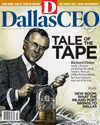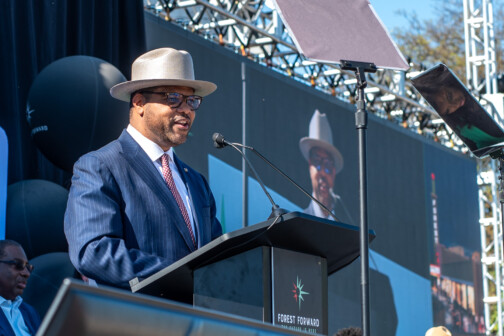| COMPANY DISBURSEMENT YEAR | NUMBER OF DEALS | AVERAGE PER DEAL (USD MIL) | SUM INVESTMENT (USD MIL) |
| 1996 | 2,469 | 4.36 | 10,762.30 |
| 1997 | 3,080 | 4.74 | 14,591.99 |
| 1998 | 3,550 | 5.84 | 20,718.89 |
| 1999 | 5,396 | 9.91 | 53,487.98 |
| 2000 | 7,812 | 13.36 | 104,379.88 |
| 2001 | 4,451 | 9.11 | 40,537.78 |
| 2002 | 3,053 | 7.11 | 21,692.68 |
| 2003 | 2,876 | 6.82 | 19,613.81 |
| 2004 | 2,991 | 7.28 | 21,768.86 |
| 2005 | 3,027 | 7.25 | 22,261.59 |
In the deepest, darkest days of the dot-com decline, when communications providers such as WorldCom, NorthPoint Communications, Global Crossing, and XO Communications were filing bankruptcies for various and sundry reasons, Allen-based Sage Telecom achieved distinction for its unparalleled growth. Winner of the prestigious Dallas 100™ Award in 2003 as the fastest-growing, privately held company in the Dallas area, Sage succeeded where many of its peers failed because of its disciplined management practices, long-term view of the market, and unique business concept—namely, delivering local, long-distance, and Internet access services to residential and small business customers primarily in underserved rural areas and suburban markets. The example of Sage, a company that succeeded when the cold, hard facts indicated a telecom market in decline, is instructive in evaluating the state of entrepreneurship in Dallas today.
The Pundits’ Perspective
For the past few years, industry prognosticators and journalists alike have rendered lukewarm verdicts about the entrepreneurship market in America based on indicators such as the amount of capital being invested in new ventures and the number of initial public offerings—the ultimate goal toward which many entrepreneurs strive. In defense of these pundits and reporters, these two data sets have not been overwhelmingly positive at either the national or local levels (see above).
While the first three quarters of 2006 showed signs of an uptick in venture capital investment nationwide, with each quarter bringing in more than $6 billion, Table 1 plots the history of U.S. venture capital investments since 1996. You can see that, after peaking in 2000, the last four years of investment activity have plateaued around the 1998 level of investment.
The 10-year history of venture capital investment in the Dallas area has followed a similar trajectory, declining sharply from its apex in 2000 and more recently leveling off.
From 1990 through 2000, about 200 venture-backed IPOs were launched per year in the United States. The yearly average since then is under 50, according to Thomson Financial. And the number plummeted to only eight IPOs in the third quarter of 2006, reflecting the slowest quarter since 2003. While the Dallas-Fort Worth area rebounded with seven IPOs in 2005, the local market has continued to perform inconsistently since its 1999 high of nine IPOs.
When viewed together, these data paint a picture of an entrepreneurial landscape that’s tepid and uncertain at best. But as the director of the Caruth Institute for Entrepreneurship at SMU’s Cox School of Business—one of the oldest entrepreneurship centers in the nation—I’m afforded a unique perspective on the local entrepreneurship market that yields a somewhat rosier outlook. For the past three decades, I have had the privilege of teaching, consulting with, and sponsoring local meetings for thousands of practicing and aspiring entrepreneurs. Through these various activities, I have experienced firsthand the city’s intrinsic entrepreneurial spirit and gained access to additional data that indicate a healthier state of entrepreneurship in Dallas than is suggested by the aforementioned sources.
Intrinsic Entrepreneurial Spirit Fuels Start-Ups
Founded on a vast prairie with few natural resources and no easy access to waterways for transporting goods, Dallas has, from its early years, challenged businessmen and -women to make something from nothing. Today, highways and buildings in Dallas aren’t named after poets; rather, the city’s landmarks acknowledge the acumen and tenacity of men like Robert Thornton, W.W. Caruth Sr., and his son Will Caruth Jr., who forged a diverse network of empires from the hard-scrabble ground up. With its pro-business mindset, favorable regulatory environment, high quality of life, and relatively low cost of living, Dallas continues to be a place where people with novel ideas, business know-how, and dogged resolve can succeed. Over the years, the city’s intrinsic spirit has manifested itself through a steady demand for entrepreneurial education, a thriving support network for aspiring entrepreneurs, and a consistent stream of fast-growing companies.
| >> THE TAKEAWAY |
| 1. The numbers for entrepreneurs are lukewarm. |
| 2. But numbers only tell half of the story. |
| 3. Dallas is, has been, and always will be fertile ground for business mavericks. |
Demand for Entrepreneurship Education Remains Strong
One example of this is the Caruth Institute’s Starting A Business certificate course, which has been offered to the general public three times a year for 34 consecutive years. During that time, attendees of this course have represented a true cross-section of the Dallas-Fort Worth community: young and old, male and female, well-educated and not-so-well-educated, upper income and lower income. All have been in one of three stages of entrepreneurial endeavor. Some have already launched businesses and are looking for the tools and rules to take their companies to the next level. Others have developed business plans and are looking for validation as well as implementation strategies. And still others have formulated an idea with the hope that the course will assist them in deciding whether or not to pursue it. Whether students aspire to launch consultancies, business-to-business high-tech companies, or retail ventures, our goal is to ensure that they have a solid grasp of the fundamental principles of launching and running a small business.
Since the course’s inception in 1972, enrollment has remained strong, averaging 65 students for each spring, summer, and fall session, with the fall 2006 session attracting 74 individuals. Over the years, some 7,000 aspiring or practicing entrepreneurs in the Dallas-Fort Worth area have sought instruction to improve their chances of winning. So if this class is any proxy for some percentage of the number of new entrepreneurs entering the marketplace, it has been consistently robust for more than three decades.
Network for Entrepreneurs Continues to Flourish
In Dallas’ early years, its most influential business people joined together out of necessity, recognizing that a pervasive pro-business tide would raise all ships—or at least those that were truly seaworthy. Since that time, even as Dallas has grown into the fourth-largest metropolitan area in the nation, its support network for entrepreneurs has remained strong and close-knit. The Southwest Venture Forum is one example of this. Founded in 1984 by a local venture capital firm, the forum strives to bring entrepreneurs and investors together to bolster the Dallas-Fort Worth venture infrastructure. Professionals such as attorneys, accountants, bankers, and consultants who serve growth-oriented entrepreneurs and their investors are also welcome to attend these forums.
In 1988, the Caruth Institute was asked to assume responsibility for managing the Southwest Venture Forum. Today, the forum meets six times a year. At each session, two competitively selected entrepreneurs have five minutes to “pitch” their business plans to the select audience. These pitches are then followed by a special program, which ranges from presentations by distinguished entrepreneurs to lively panel discussions featuring venture capitalists or industry experts. Presenters and attendees gather before and after the formal portions of the program to network and exchange best practices.
For more than 20 years, the Southwest Venture Forum has never experienced a shortage of entrepreneurs competing to get their five minutes in front of venture capitalists and industry professionals. During that same time period, the number of people registering to attend the forums has averaged 200—ranging from 100 or so people in the early years to 500 at the peak of the dot-com boom.
DFW Initial | |
January 1996- | |
1996………. | 3 |
1997………. | 4 |
1998………. | 6 |
1999………. | 9 |
2000………. | 4 |
2001………. | 4 |
2002………. | 2 |
2003………. | 3 |
2004………. | 2 |
2005………. | 7 |
2006………. | 4 |
SOURCE: HOOVER’S ONLINE | |
Potential for Fast Growth Persists Even in Tough Times
In the past two decades, the Dallas-Fort Worth economy has risen and fallen from booms and busts in real estate, high-tech, and telecommunications. But through the turbulence of these major events, local entrepreneurs have been able to successfully grow every kind of business imaginable—from dry cleaning and mattress companies to high-speed optical network providers. The Dallas 100™ Awards, a program that identifies the 100 fastest-growing, privately held companies in the Dallas area each year, exemplifies the local economy’s resilient high-growth potential.
Since 1990, the Caruth Institute has managed the Dallas 100™ Awards. For the past 17 years, the program has experienced a surplus of applications from fast-growing successful companies. During that time, we have not had to adjust the selection criteria to come up with a list of at least 100 companies. Each year, the winning companies’ sales have always totaled between $2.5 billion and $3 billion. The top 100 companies’ average growth rate in sales for the two previous years has been approximately 100 percent per year. (It was 104 percent for the 2006 winners.) This has been true in good economic times and in bad. Furthermore, an attempt to determine a trend regarding the type of company that wins—such as high-tech, low-tech, wholesale, retail, service, or manufacturing—has not proven fruitful.
Conclusion
Regardless of the uncertain venture capital investment market or the inconsistent IPO market in the past six years, three underlying indicators remain strong in the Dallas-Fort Worth area:
•The demand for entrepreneurial education;
•The desire for entrepreneurs, venture capitalists, and industry professionals to network and share best practices; and
•The rate of growth for successful new companies.
These facts suggest that, like Sage Telecom, start-ups with top-rate management teams and a compelling business idea can launch and build successful companies in Dallas in virtually any industry or economic environment.
 |
Jerry F. White is the director of the Caruth Institute for Entrepreneurship at SMU’s Cox School of Business. He has taught and counseled more than 22,000 entrepreneurs since joining the Institute in 1971. He is co-author of The Entrepreneur’s Master Planning Guide and Administering the Closely Held Company and has published articles in numerous journals, including the Harvard Business Review and the Journal of Small Business Management.





